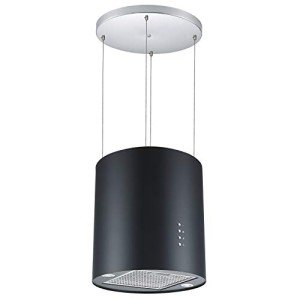10 Ways To Create Your Island Extractor Fan Empire
페이지 정보
작성자 Charolette Toll… 댓글 0건 조회 3회 작성일 25-05-20 10:17본문
Everything You Need to Know About Island Extractor Fans
Island extractor fans, typically referred to as Island range hood hoods or island range hoods, are vital appliances in modern kitchen areas, particularly those with cooking islands. These flexible gadgets not only improve the visual appeal of a kitchen but also play an essential function in maintaining air quality by eliminating smoke, steam, grease, and odors produced during cooking. This post explores the different elements of island extractor hoods extractor fans, including their functionalities, types, island range hood installation pointers, and upkeep.

What is an Island Extractor Fan?
An island extractor fan is a type of kitchen ventilation system created to hang from the ceiling and is typically installed above a kitchen island. Unlike conventional wall-mounted hoods, island extractors are focused over the cooking location, offering unblocked air flow and efficient extraction abilities.

Key Functions of Island Extractor Fans:
- Air Filtration: Island extractors filter out smoke, steam, and grease particles from the air, Island Range Hood helping to keep your kitchen and home environment tidy.
- Smell Removal: By expelling unwanted cooking smells, these fans guarantee a more pleasant cooking experience.
- Improved Air Quality: Maintaining excellent air quality is crucial for health and wellness; island extractor fans assist achieve this by venting out contaminants.
- Visual Appeal: With various styles readily available, island ventilation hoods fans can likewise serve as a trendy centerpiece in modern-day kitchen styles.
Types of Island Extractor Fans
Island extractor fans can be categorized based upon their design and functionality, which can impact their option for various cooking areas. Below are the primary types of black island cooker hoods extractors:
| Type | Description |
|---|---|
| Ducted Hoods | These hoods expel air outside through ductwork, supplying optimum ventilation. They need more complicated setup due to the requirement for ducts. |
| Ductless Hoods | These hoods filter air and recirculate it back into the kitchen. They are easier to set up but may be less effective for heavy cooking. |
| Convertible Hoods | These versatile hoods can function as either ducted or ductless, offering house owners flexibility based upon their kitchen design. |
Choosing the Right Type
Aspects affecting the type of island extractor fan you pick include your cooking routines, kitchen style, and whether you have access to external venting.
Installation of Island Extractor Fans
Installing an island extractor fan needs mindful factor to consider and preparation to guarantee optimal performance and security. Here's a detailed guide to help with effective setup:
Installation Steps:
Determine Placement: Identify the perfect location for the extractor fan, ensuring it is placed directly above the cooking location.
Measure Ceiling Height: Ensure compliance with recommended height allowances which generally recommend mounting the fan in between 24 to 30 inches above the cooktop.
Install Electrical Wiring: Ensure that the place has access to electrical points and, if appropriate, ductwork for venting.
Protect Structural Support: Since 48 island range hood extractors hang from the ceiling, it's vital to provide adequate support, often needing additional brackets or framing.
Mount the Hood: Following the manufacturer's guidelines, safely connect the hood to the ceiling.
Link Ductwork (if essential): For ducted hoods, link the needed ductwork in accordance with building regulations.
Test Functionality: Once installed, run the fan to guarantee it operates correctly and efficiently.
Maintenance Tips for Island Extractor Fans
Regular maintenance assists in prolonging the life of island extractor fans and preserving optimum efficiency. Here are a couple of maintenance tips:
- Clean Filters: Depending on the type, either tidy or change filters periodically-- typically every three months.
- Clean Down Surfaces: Clean the outside surface areas regularly to prevent grease buildup.
- Inspect for Obstructions: Ensure the exhaust ducts are clear of any blockages to keep air flow.
- Examine Electrical Components: Regularly inspect wiring and connections to ensure whatever remains in safe working order.
Frequently Asked Questions (FAQs)
1. How do I know if I need a ducted or ductless island extractor fan?
Selecting in between ducted and ductless depends on your kitchen layout. If your kitchen can accommodate ductwork that leads outside, a ducted fan is more effective for optimal ventilation. However, if ductwork setup is unwise, a ductless fan might be an appropriate option.
2. How loud are island extractor fans?
Noise levels differ significantly among different models. Normally, try to find fans with a noise score of 60 decibels or lower for a quieter operation.
3. Can I install an island extractor fan myself?
While DIY setup is possible, it's recommended to work with a professional, particularly for ducted models, to make sure compliance with structure codes and security policies.
4. How often should I clean up the filters of an island extractor fan?
It's recommended to tidy or replace the filters every 3 months or when you observe decreased efficiency in air filtering.
5. What is the typical cost of an island extractor fan?
Costs can range substantially based upon brand name, design, and functions, typically costing anywhere from ₤ 300 to ₤ 2,000. Setup costs should also be thought about.
In summary, island hob extractor extractor fans are pivotal in preserving a tidy and effective cooking environment. They not only enhance kitchen aesthetic appeals however likewise enhance air quality and cooking experience. By understanding the types available, setup processes, and maintenance regimens, house owners can make educated decisions concerning their kitchen ventilation requirements. Appreciating the significance of these home appliances can influence the total performance and convenience of a contemporary kitchen.
댓글목록
등록된 댓글이 없습니다.